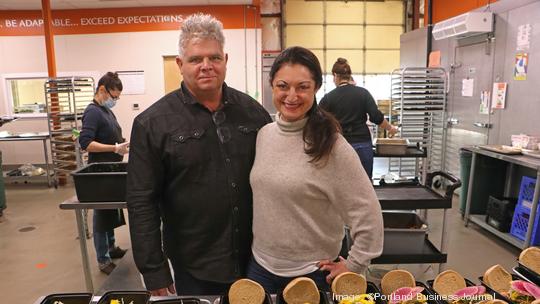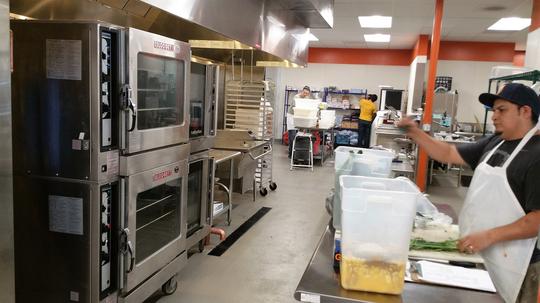
Few businesses are built to withstand the challenges of a pandemic, let alone thrive in one. Yet one local meal delivery company managed to do just that, growing 43.4% over the last three years. Coincidence? The founders think not.
After relocating from Los Angeles in 2010, married actors G. Scott Brown and Dré Slaman saw opportunity in Portland's lackluster meal delivery options, particularly when it came to healthy table-ready meals sourced from local farms. The couple launched Farm to Fit a year later, becoming one of the first businesses in Portland to deliver weekly meal plans catered to paleo, keto, plant-based, low-carb, Whole 30 and diabetes-friendly diets.

Between 2013 and 2019 alone, Farm to Fit's annual meal orders increased by 156%, indicating revenue growth of similar proportions. Now, the company is preparing for a push into Washington.
Taking the bull by the horns
While Farm to Fit’s delivery model shielded it somewhat from the pandemic-related economic calamity faced by restaurants, Covid still forced the company to pivot. Pre-pandemic, its primary clientele consisted of fitness centers and office buildings.
The initial strategy was to "stay alive,” Brown said.
"We were the only ones going to work, it felt really scary," added Slaman, who explained that the company's essential-business status allowed them to remain open and adapt kitchen operations to social distancing measures. "We all remember how hard of a time that was, but our team was relieved they had jobs to show up to, and so were we."
Then tragedy struck. According to Brown, on May 1, 2020, the Farm to Fit team lost Production Chef Juan Camacho to a sudden heart attack, leaving them to cope with their grief through work.
"[Staff] were so loyal to us through this really traumatic event for all of us," said Brown. "[Camacho] was a dear friend, and it was really hard, but it brought us together through that strange dark time."
All the while, Farm to Fit's monthly orders gradually increased. In response to community concerns over food availability in late March, the company began providing 200 extra meals on-demand, departing from its typical advanced-order model. "We were adapting to people's crisis mode a little bit," said Slaman. "We were in crisis mode, too. I think we all were."
By summer’s end, Farm to Fit was fulfilling up to eight thousand additional orders per month, ending the year with a 33% jump in meal orders and a 30% increase in revenue from 2019.

“I think that really helped us from a strategy standpoint,” said Slaman. “We weren't advertising, but I think the word got out that, 'Oh, call them, they can help you.’”
Making hay while the sun shines
The last time Brown and Slaman saw annual meal counts jump over a two-year period, they upgraded Farm to Fit's kitchen location and extended its customer reach to include the Salem area. The upgrade enabled the kitchen to expand production capacity, which founders believe prepared them most for the onslaught of incoming orders in 2020.
Now the founders are expanding Farm to Fit’s service areas to include Olympia and Tacoma, but pushing the company forward hasn’t been without its difficulties.
Since Farm to Fit sources ingredients from local farms and purveyors, recent spikes in inflation, labor shortages and extreme weather have had a domino effect on farms and the businesses they serve. According to Brown, crop shortages and delivery delays are common contributors to increased labor costs and menu changes.
Hiring more delivery drivers is also tricky for the company, as competing employers like Lyft, Uber and Amazon have increased driver pay and bonus rates.
"Now Amazon's paying $22 an hour plus $5,000 to join," said Brown. "It's hard to compete."
Nevertheless, Brown and Slaman are optimistic about the upcoming expansion. While the company’s monthly growth plateaued in May 2021, the founders report that business has not declined and has since taken a pattern resembling pre-covid times.
"What we have found is that people have utilized Farm to Fit to put a routine into their at-home workdays," the couple later wrote, adding, “We are excited for the new year and expect the return of some of that growth.”
In the meantime, Brown and Slaman are keeping an eye out for a storage warehouse and potential satellite kitchen in Washington and remain active in Portland's acting community.
Slaman is starring in an upcoming Netflix movie and currently serves as a board chair of the Oregon Children's Theater and as a managing director of the Fertile Ground Festival of New Works.
Farm to Fit
What it does: Meal preparation and delivery
Founded: Nov. 1, 2011
Founders: G. Scott Brown and Dré Slaman
Revenue: 2020, $2.31M (3-year growth rate, 43.4%)
Employees: 30 (about half part-time)
Best-selling plan: 1,200 calorie meal plan
Best-selling meal: Tuscan beef stew
Local partners: Sauvie Island Organics, Hood River Organics, Gathering Together Farms, Charlie’s Produce, SP Provisions
Meals delivered timeline
2013: 49,000
2014: 74,400 (+51.8%)
2015: 100,800 (+35.5%)
2016: 108,400 (+7.5%)
2017: 108,600 (+0.2%)
2018: 108,700 (+0.1%)
2019: 125,300 (+15.3%)
2020: 167,000 (+33.3%)
2021: 185,000 (+10.8%)



